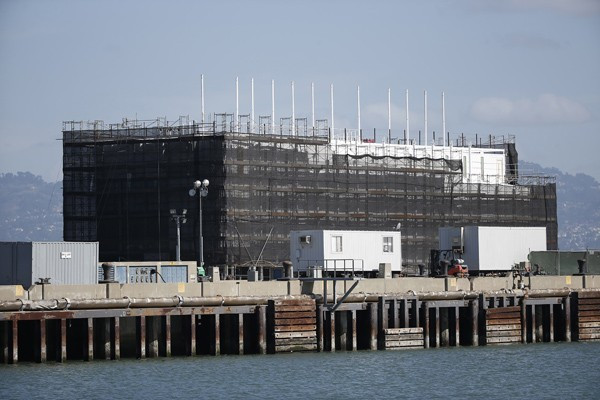Mystery Barges will be Luxury Google Glass Showrooms and Party Boats
Three huge barges moored in US ports are believed to be luxury showrooms and entertainment venues for promoting Google Glass to invitation-only customers.

Shrouded by mystery and scaffolding in equal measures, two of the three barges are moored in San Francisco Bay, while a third was spotted more recently on the East Coast in Portland, Maine, and is also believed to be operated by Google.
San Francisco-based and CBS-owned television station KPIX 5 claims to have heard been told by multiple sources that the barges have been planned for over a year.
The sources said the barges were the brainchild of the search company's secret Google X skunkworks facility - also behind the development of Glass - and represented the company's attempt to upstage Apple's renowned retail stores.
Dazzling showrooms
A further source, who has been aboard one of the barges, said the first three decks were designed to be "dazzling showrooms" which could be fitted with chrome features and floor lighting. The fourth deck was said to be a "party deck" designed to feature bars and space where Google executives could entertain guests.
Interest in the barges spread after they were spotted by local media in September. MailOnline reporters hired a boat to visit the site and claimed they were followed by private security guards.
The news site claims to have found wi-fi antennas, sewage pipes, air-conditioning ducts and "impressive staircases and balconies" on two of the barges.
Shell company
Local media reports claimed that the barges were registered to a company called By and Large LLC, which is the same name as a fictitious company in the Disney Pixar film Wall-E. In the film, By and Large looked after fat and lazy humans on a spaceship after the Earth becomes uninhabitable.
According to Reuters, Google has forced at least one US Coast Guard to sign a non-disclosure agreement, while another unidentified person, an inspector for a Californian government agency, admitted having to do the same.
At least one barges was constructed from 40ft shipping containers that can easily be dismantled and rebuilt elsewhere. That would give Google great freedom in taking the structures around the world to promote Glass, which goes on sale to the general public next year.
Currently only available to US-based developers and close friends or colleagues of Google, Glass Explorer Edition costs $1,500 (£940), and although it functions as a head-up display and hands-free interface for connected smartphones, the device is still essentially a prototype.
The gadget has drawn widespread criticism for its integrated camera, which can be used to film everything the wearer sees without it being obvious that subjects were being recorded.
© Copyright IBTimes 2025. All rights reserved.






















